Femia > Health Library > Getting Pregnant > Planning pregnancy > How long after sex does implantation occur: Understanding the timeline
How long after sex does implantation occur: Understanding the timeline
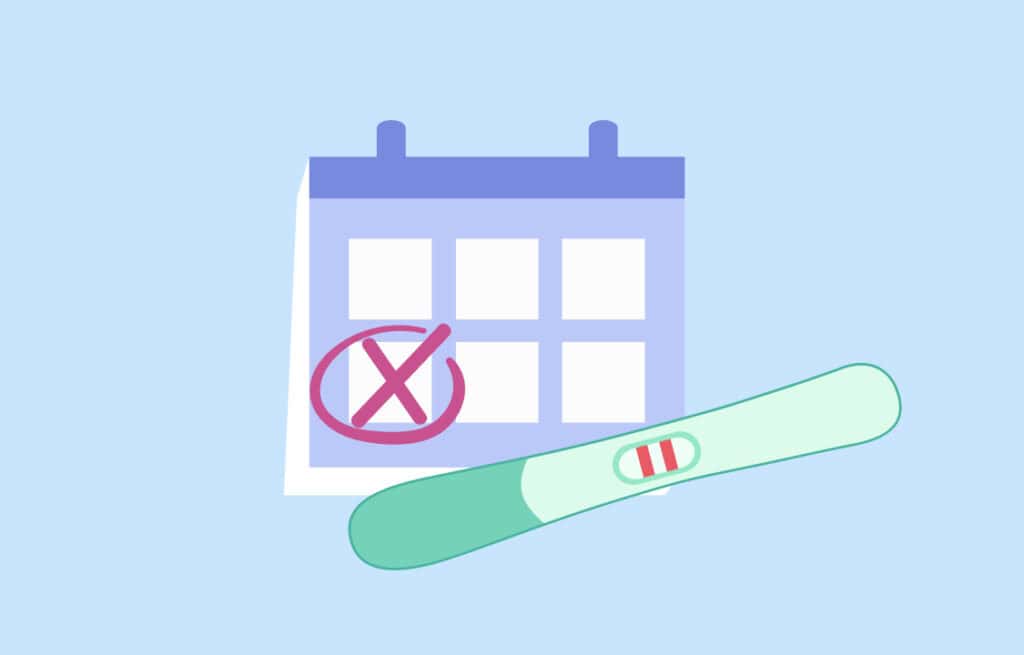
- Updated Mar 2, 2025
- Published
CRAFTED BY HUMAN
Crafted by human At Femia, we provide accurate and up-to-date information at every stage of your journey, from trying to conceive, pregnancy and postnatal support. All content is created by a real person based on in-depth research and own professional experience. Femia ensures that you will receive expert advice, strict accuracy and a personalized approach from our authors/medical experts. Learn more about our editorial policy.
FACT CHECKED
Fact checked At Femia Health, we maintain the highest standards of editorial excellence in delivering content focused on helping you conceive, guiding you through pregnancy, and supporting you postpartum. Explore our content review principles to learn how we ensure the accuracy and quality of our health and lifestyle tips for every stage of your journey.
Implantation usually occurs between six to ten days after conception. While some women may experience symptoms such as light bleeding and cramping, others don’t notice anything out of the ordinary during these very early days of pregnancy.
Implantation is the moment a fertilized egg attaches itself to the uterine lining. This is the beginning of your pregnancy; it happens around six to ten days after fertilization.
Soon after implantation, the egg will start producing the hormone human chorionic gonadotropin (hCG). HCG levels rise rapidly during the early days of pregnancy, so that by the time of your missed period, they will be detectable by a home pregnancy test.
The wait can be tricky, and even before you can take a pregnancy test, you may find yourself looking for signs of implantation to see whether you have been successful this month. However, while some women experience implantation bleeding and cramping, not all do, so a lack of symptoms doesn’t mean you aren’t pregnant.
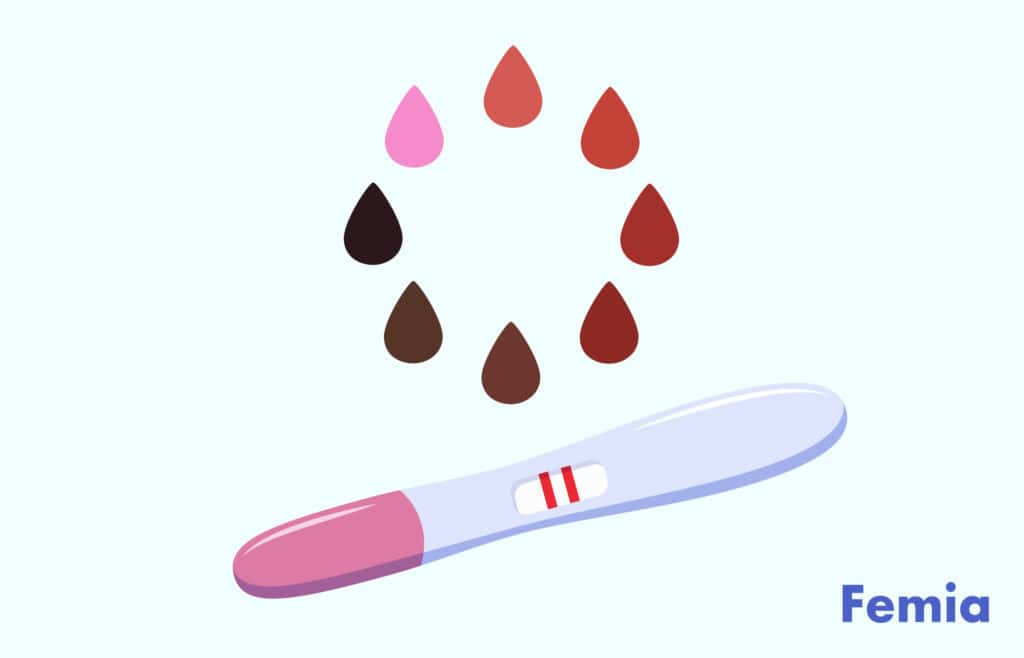
The fertilization process
Pregnancy cannot happen without a sperm first fertilizing an egg. There are millions of sperm in one ejaculation, and these sperm compete to find and fertilize the egg. But, according to Molecular Biology Of The Cell, only around 200 will get anywhere near the egg.
How fast can you get pregnant after sex?
Though women may claim to have known they were pregnant within minutes of having sex, this is unlikely. If a sperm can find the egg quickly, fertilization can occur within minutes; however, this doesn’t always happen. And even if it does, you wouldn’t experience symptoms. Fertilization usually happens in the fallopian tube, but pregnancy doesn’t technically begin until several days later, when the fertilized egg implants in the lining of the uterine lining.
To get pregnant, you should have regular sex during your fertile window, which begins five days before ovulation and ends the day after ovulation occurs. Sperm can survive inside the female body for up to five days, and an egg can survive for between 12 and 24 hours after ovulation. So, this seven day period during which a sperm and an egg have the chance of meeting is called the “fertile window.”
👉Find out more: Understanding ovulation symptoms: Mood changes explained
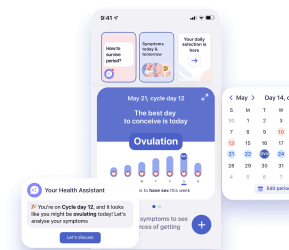
How long does it take to conceive after sex?
While many people assume they know the day they conceived based on the day they had sex, but the actual timing of fertilization can vary. After intercourse, sperm can live inside the female reproductive system for up to five days, waiting for an egg to be released.
According to a 2009 research trial published in the British Medical Journal, sperm takes 2–10 minutes to reach the fallopian tube after ejaculation. However, depending on the exact day of ovulation—which is hard to pinpoint—conception might not happen until up to five days after sex.
How long after sex does implantation happen?
Pregnancy begins the moment the fertilized egg implants in the uterine lining. Implantation generally happens between six and ten days after ovulation, though this range can vary. Additionally, the day you have sex might not be the day of ovulation.
Journey to the uterus
Fertilization usually occurs in a fallopian tube, as the egg travels toward the uterus. As soon as a sperm fertilizes the egg, the outer shell of the egg hardens to keep out the other sperm. At this point, the fertilized egg is known as a zygote.
The zygote must then travel down the fallopian tube to reach the uterus before implantation can occur. According to the MSD Manual, it takes around three to five days to complete this journey. The length of the journey depends on where in the fallopian tube fertilization occurred; if the sperm and egg fused high in the tube, then the journey to the uterus will take longer. The zygote cells divide continuously during this journey, so the zygote becomes a blastocyst when it reaches the uterus.
Implantation timeline
Implantation is the process whereby the blastocyst embeds itself in the uterine wall. This process is usually completed by day nine or ten after ovulation, though it can be sooner or later. Once implanted in the uterus, the blastocyst can begin its transformation into an embryo.
If implantation doesn’t occur, the blastocyst will start to break down and be expelled.. Without implantation, no hCG hormone is produced, so you wouldn’t even know there had been a fertilized egg. According to the University of California San Fransisco, 50% of all fertilized eggs fail to implant.
Implantation is generally seen as the start of pregnancy. However, it’s important to note that when dating your pregnancy, you start from the first day of your last period to find your gestational age. By the time you take a pregnancy test, you’re already around four weeks pregnant by gestational age.
Factors affecting implantation
It can take time to get pregnant. According to BMJ Publishing Group Ltd, around a third of couples will conceive during the first month of trying, and 75% will be pregnant within six months. This rises to 90% within one year. Your chance of conceiving can be affected by various factors, including your age, lifestyle, BMI, and reproductive health. Factors affecting implantation include:
Reproductive health
Good reproductive health is crucial for pregnancy. If you know you have a health condition that could be impacting your ability to conceive, you should speak to your OBGYN for advice. Endometriosis, polycystic ovary syndrome (PCOS), and polyps could be preventing pregnancy.
Timing
You need to have sex during your fertile window to get pregnant. You can achieve this by having sex every two to three days throughout the month. Or, you may prefer to time your sex deliberately to coincide with your fertile window. Ovulation tests and fertility tracker apps can give you an idea of your fertile window each month.
Age
According to the American Society for Reproductive Medicine, a healthy 30-year-old woman has a 20% chance of conceiving each month. By age 40, this falls to 5%. If time is not on your side, speak to your OBGYN for advice.
Smoking
A 2011 study published in Human Reproduction found that smoking was a risk factor for late implantation. Late implantation occurs when the fertilized egg takes longer than the typical 6-12 days to implant in the uterus. This delay can disrupt the delicate hormonal environment necessary for a successful pregnancy, increasing the risk of miscarriage. The study also found that non-smokers exposed to secondhand smoke in the home had an increased risk of late implantation, though the association was not as strong as with maternal smoking. The presence of harmful substances from smoke, such as nicotine and other toxins, can negatively impact the uterine lining and embryo, potentially leading to complications in implantation and pregnancy.
Maternal health
Your health can impact your ability to fall pregnant. To ensure that you are in good health, you should stop smoking,completely cut out your alcohol intake, and reduce your stress levels. Regular exercise is vital, and a healthy, balanced diet rich in fresh foods can boost your health.
Maternal anxiety
According to a 2022 study published in Communications Biology, women with higher levels of stress hormones were more likely to suffer failed embryo transfers during IVF (in vitro fertilization).
Knowing this may not feel helpful if you are already anxious, because it may feel out of your control and cause you more worry. However, there are things you can do to try and reduce your stress levels. Mindfulness, regular exercise, time in nature, and time with your loved ones are great ways to reduce stress. However, if these methods aren’t sufficient, it’s important to seek help from mental health professionals. It’s perfectly okay to get professional help for anxiety or other mental health concerns, as they can provide specialized support and treatment options.
👉Find out more: Thinking about conception? Genetic testing before pregnancy explained
Early signs of implantation
First, it’s vital to remember that not all women experience implantation symptoms. While some women notice clues that implantation has occurred, others don’t notice anything out of the ordinary during the very early days of pregnancy. Whether you experience signs of implantation or not is not an indicator of your fertility or the health of your new pregnancy.
Implantation bleeding
Some women experience implantation bleeding around the time of their missed period. This light bleed can vary in color from light pink to brown and last up to three days. It should be lighter than your regular period and not contain any clots. You may experience light cramps at the same time.
Early pregnancy symptoms
Once implantation has occurred, your hormones will start to rise, and this can lead to noticeable pregnancy symptoms. Early pregnancy symptoms include breast tenderness, pregnancy nausea and sickness, fatigue, and needing to urinate more often.
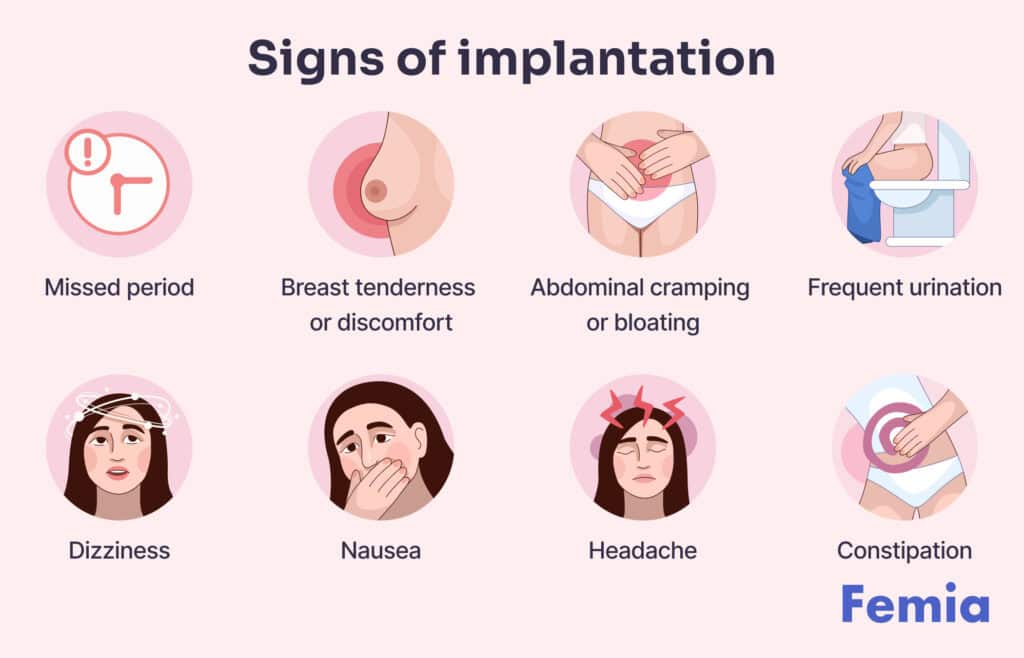
How soon after sex can you get pregnant?
A sperm can fertilize the egg within minutes of having sex, though it can take up to five days for fertilization to occur. You are generally thought to be pregnant once implantation has occurred, which is usually between 6–10 days after fertilization.
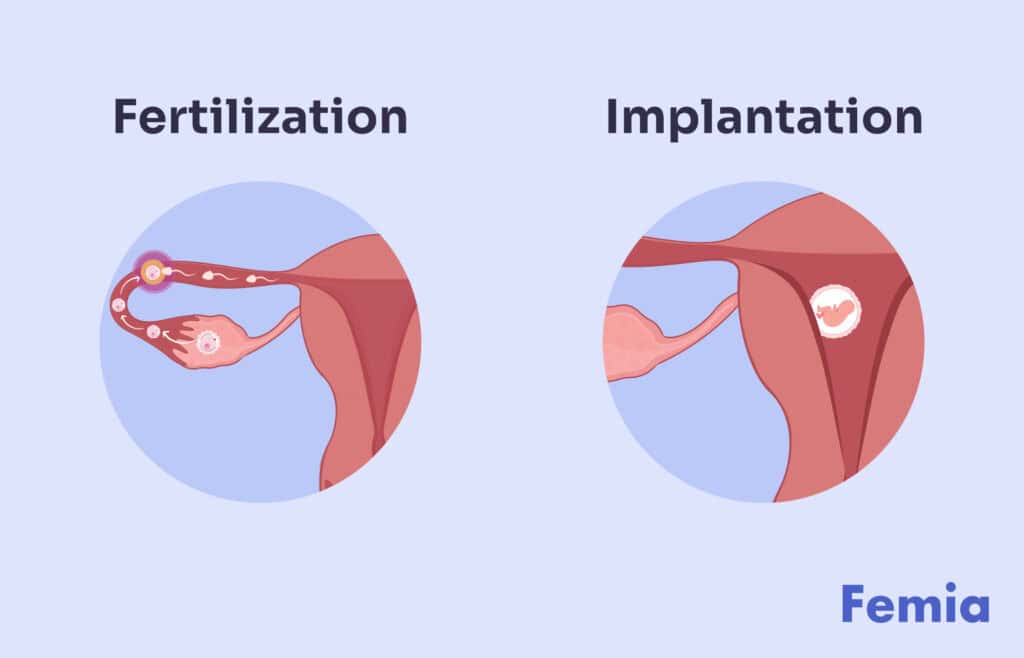

How soon can you detect pregnancy?
As agonizing as the two-week wait can be between ovulation and your missed period, you shouldn’t rush into doing a home pregnancy test. Taking a test too soon can increase your chances of a false negative, so it’s worth waiting before taking a home pregnancy test.
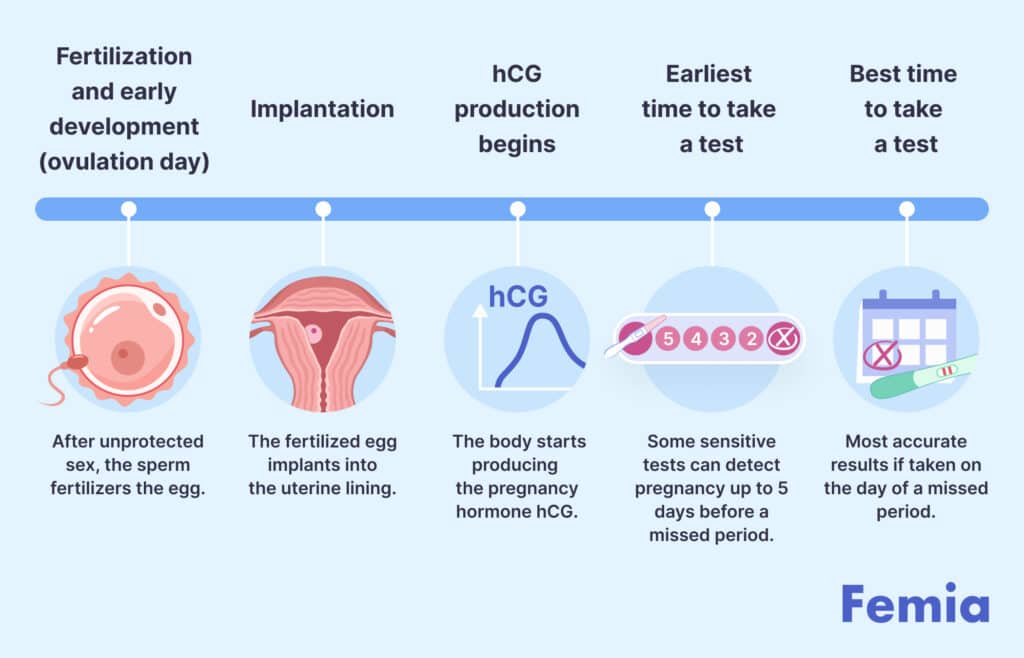
Pregnancy tests work by detecting hCG in your blood or urine. A home pregnancy test should give an accurate reading from the day of your missed period, though a blood test at the doctor’s clinic can detect hCG levels a couple of days sooner.
Home pregnancy tests vary from box to box, so it’s crucial to thoroughly read the instructions before taking the test. The instructions will tell you when and how to take the test for accurate results. False positives are rare, but false negative results can happen if you take the test too soon or incorrectly.
Questions from the Femia community
Can implantation occur earlier or later than the typical 6–10 days?
Implantation typically occurs between six and ten days after ovulation, but that doesn’t mean it always happens within that timeframe. In some instances, it can occur slightly sooner or later.
Implantation that occurs after 12 days post-ovulation has an increased risk of pregnancy loss. Smoking can increase your risk of late implantation, so it’s essential to quit smoking before trying to conceive.
What should I do if I don't experience any symptoms of implantation?
While it can be tempting to look out for implantation symptoms, you may worry yourself over nothing. Most women experience implantation symptoms. A lack of symptoms doesn’t mean you’re not pregnant; it simply means you haven’t noticed any symptoms that could potentially be due to implantation.
The two-week wait can be tough, especially if you’ve been trying to conceive for a while. Worrying about whether or not you’ve noticed any implantation symptoms can make the experience more stressful. The best thing to do is wait until the day your period is due and take a test if it is late. Until then, try to push your worries out of your mind, and keep yourself busy with activities you enjoy.
The bottom line
Implantation doesn’t occur immediately after sex. It can take up to six days after sex for a sperm to fertilize the egg, depending on when ovulation occurs. The fertilized egg must then journey from the fallopian tube to the uterus, where it will implant in the uterine lining. During this journey, the cells of the zygote will split rapidly so that by the time it reaches the uterus, it is a blastocyst.
Once embedded in the uterine lining, the blastocyst will begin to rapidly produce the hormone hCG. Home pregnancy tests can identify hCG accurately from the first day of your missed period.
Staying busy during this time, as you wait to find out if you’ve successfully conceived, can greatly reduce anxiety. This is a great time to organize catch-ups with friends and spend time on hobbies you enjoy to help the two weeks pass quickly. Obsessing over whether or not you’re pregnant won’t help you get pregnant, but it could leave you feeling stressed and anxious, so it’s definitely worth avoiding if possible.
Most couples get pregnant naturally within the first year of trying, so try not to worry too much if it doesn’t happen straight away. However, if you are 35–39 years of age, you should seek medical advice if you haven’t fallen pregnant within six months. If you are over 40 or have underlying reproductive health conditions that may be impacting your ability to conceive, you should make an appointment to see your OBGYN for advice as soon as you want to start trying for a baby.
References
- Custers I M, Flierman P A, Maas P, Cox T, Van Dessel T J H M, Gerards M H et al. Immobilisation versus immediate mobilisation after intrauterine insemination: randomised controlled trial BMJ 2009; 339 :b4080 doi:10.1136/bmj.b4080 https://www.bmj.com/content/339/bmj.b4080.
- Alberts B, Johnson A, Lewis J, et al. (2002) Molecular Biology of the Cell. 4th edition. New York: Garland Science; https://www.ncbi.nlm.nih.gov/books/NBK26843/.
- Raul Artal-Mittelmark (2021) Stages Of Development Of the Fetus. MSD Manuals https://www.msdmanuals.com/en-gb/home/women-s-health-issues/normal-pregnancy/stages-of-development-of-the-fetus.
- Conception: How It Works (Accessed 2024) University of California San Fransisco https://www.ucsfhealth.org/education/conception-how-it-works.
- American Society For Reproductive Medicine (Accessed 2024) Age & Fertility https://www.reproductivefacts.org/news-and-publications/patient-fact-sheets-and-booklets/documents/fact-sheets-and-info-booklets/age-and-fertility/.
- A.M.Z. Jukic, C.R. Weinberg, D.D. Baird, A.J. Wilcox, The association of maternal factors with delayed implantation and the initial rise of urinary human chorionic gonadotrophin, Human Reproduction, Volume 26, Issue 4, April 2011, Pages 920–926, https://doi.org/10.1093/humrep/der009.
- Wu, J., Lin, S., Huang, P. et al. Maternal anxiety affects embryo implantation via impairing adrenergic receptor signaling in decidual cells. Commun Biol 5, 840 (2022). https://doi.org/10.1038/s42003-022-03694-1.
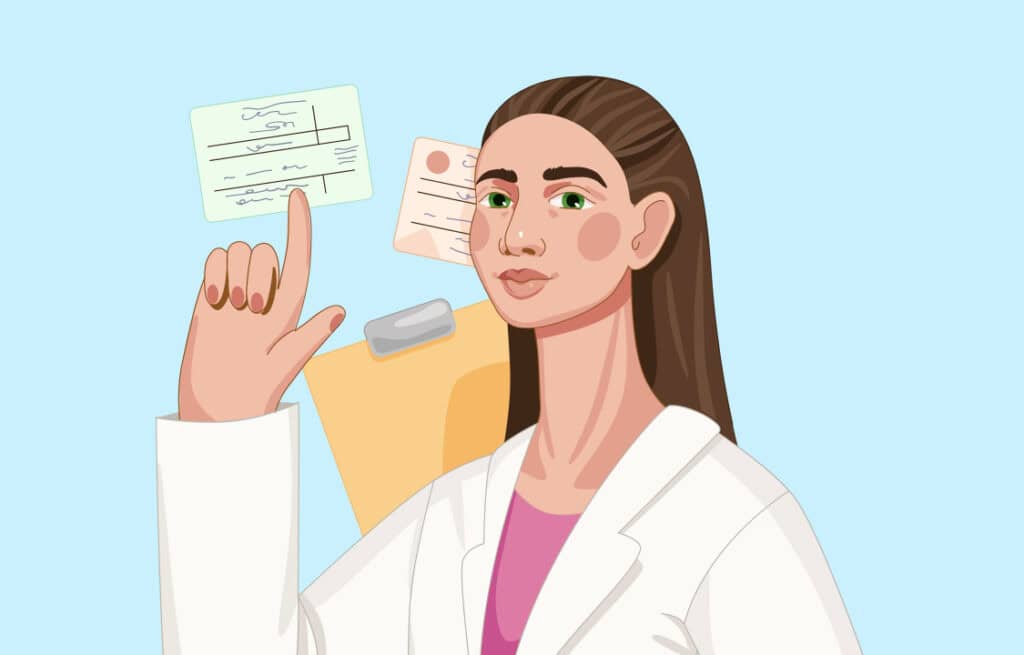
Prepare for a healthy pregnancy with our ultimate pre-pregnancy checklist. Learn about essential tests, lifestyle adjustments, financial planning, and more to ensure a smooth journey to parenthood.
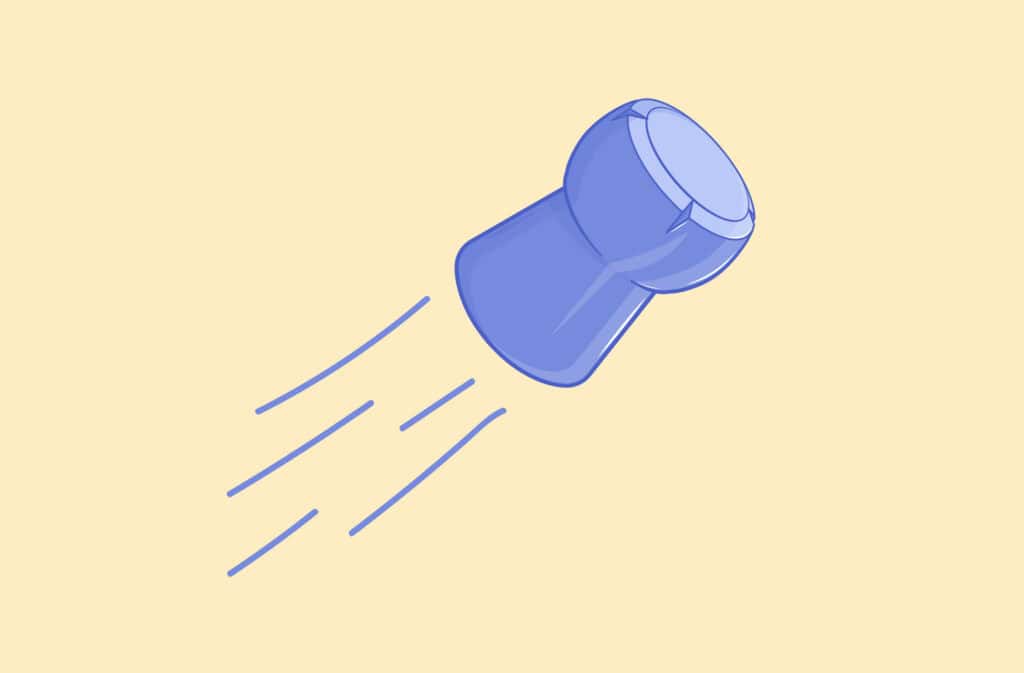
Discover things to avoid after losing mucus plug and what to do next. Learn how long after losing mucus plug labor starts and what happens to your body. Expert advice from Femia.

Wondering if you can eat honey while pregnant? Learn its benefits, risks, and safe practices for consumption during pregnancy to help with symptoms like nausea and constipation.

